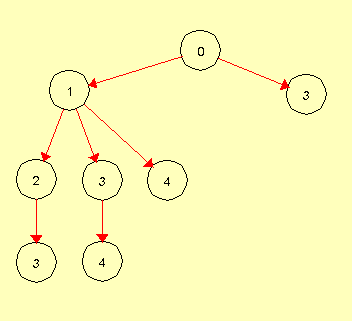fork:
#include <sys/types.h> #include <unistd.h> pid_t fork(void);return -1 if error
Example 2.3, Page 44: What is the value of x for each process?
Example 2.4, Page 44: Parent and child print different messages
Example 2.5, Pages 44-45: a chain of processes, parent always breaks
Example 2.6, Page 45: a fan of processes, the child breaks
Example 2.7: page 46: a tree, only break on error
Problem from Spring 2001 Final Exam:
Trace the following program segment and determine how many processes are
created. Assume that no errors occur.
Draw a graph that shows how the processes are related. In this graph each
process will be represented by a small circle containing a number that
represents which fork
created the process. The original process will contain 0 and the process
created by the first fork will contain 1.
There will be arrows from each parent to all of its children.
Each arrow should point in a downward direction.
c2 = 0;
c1 = fork(); /* fork number 1 */
if (c1 == 0)
c2 = fork(); /* fork number 2 */
fork(); /* fork number 3 */
if (c2 > 0)
fork(); /* fork number 4 */

wait:
#include <sys/types.h> #include <sys/wait.h> pid_t wait(int *stat_loc); pid_t waitpid(pid_t pid, int *stat_loc, int options);wait:
waitpid:
Allows you to wait for a particular process, or all process if pid
is -1.
Important option is NOHANG which will return 0 if there is a specified
child to wait for but it has not yet terminated.
Important values of errno:
ECHILD no unwaited for children
EINTR a signal was caught
The status value is 0 if and only if the process terminated normally and
returned 0. In all other cases the status should be examined using the
provided macros defined in sys/wait.h.
Example 2.8 on pages 48 and 49 illustrate the use of these.
Example 2.9. Page 50: Wait until a particular child finishes:
while (childpid != wait(&status)) ;
Example 2.10, page 51: The correct way to wait for a particular child:
while (childpid != wait(&status))
if ((childpid == -1) && (errno != EINTR) )
break;
Example 2.11, Page 51: Wait without blocking for all children that have finished:
while(waitreturnpid = waitpid(-1, &status, WNOHANG))
if (!((waitreturnpid == -1) && (errno != EINTR)))
break;
Exercise 2.4, page 52: A process fan like in Example 2.6.
Exercise 2.5, pages 52-53: A process chain like in Example 25.
Each process waits for its child before printing.
The messages appear in reverse order of process creation.
exec
#include <unistd.h>
int execl(const char *path, const char *arg0, ...,
const char *argn, char * /*NULL*/);
int execlp (const char *file, const char *arg0, ...,
const char *argn, char * /*NULL*/);
int execle (const char *path,char *const arg0, ... ,
const char *argn, char * /*NULL*/,
char *const envp[]);
int execv(const char *path, char *const argv[]);
int execvp (const char *file, char *const argv[]);
int execve (const char *path, char *const argv[],
char *const envp[]);
The execl forms take a variable number of parameters with a
NULL-terminated list of command line arguments.
The p forms use the PATH environment variable to search
for the executable.
The e forms allow you to set the environment of the new process
rather than inheriting it from the calling process.
Program 2.6 from Pages 53-54 show a program that creates a child to execute
ls -l.